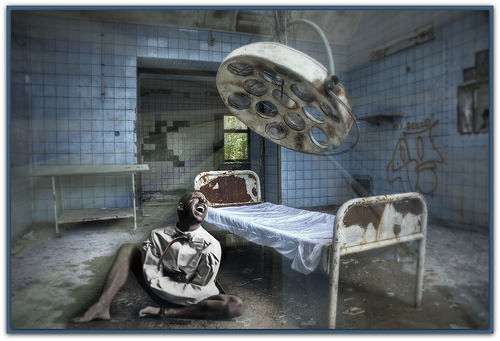No, Arbitrarily Locking Up People Instead of Restricting Guns Isn't a Good Option Either
Charles Krauthammer looks at the Navy Yard shooting and sees, it isn't the guns we need to restrict--it's the crazy people!

He writes of an incident in which the Navy Yard killer Aaron Alexis called cops in Rhode Island last month and said he
was hearing voices. Three people were following him, he told the cops. They were sending microwaves through walls, making his skin vibrate and preventing him from sleeping. He had already twice changed hotels to escape the men, the radiation, the voices……
Had this happened 35 years ago in Boston, Alexis would have been brought to me as the psychiatrist on duty at the emergency room of the Massachusetts General Hospital. Were he as agitated and distressed as in the police report, I probably would have administered an immediate dose of Haldol, the most powerful fast-acting antipsychotic of the time…..
If I had thought he could be sufficiently cared for by family or friends to receive regular oral medication, therapy and follow-up, I would have discharged him. Otherwise, I'd have admitted him. And if he refused, I'd have ordered a 14-day involuntary commitment…
We cannot, of course, be cavalier about commitment. We should have layers of review, albeit rapid. But it's both cruel and reckless to turn loose people as lost and profoundly suffering as Alexis, even apart from any potential dangerousness.
There are all sorts of things we could do in to violate the rights of citizens because they are in a class that sometimes but really hardly ever goes on to commit a crime. Of course, it's best, as Krauthammer does, to say it's not just for our (possibly presumed) good that we do it: it's for theirs.
Since even in Krauthammer's best case scenario, he could only have had the chance to drug/lock up Alexis for his disordered sayings for a while, it's not even clear why he sees this as a solution to what things he might or could have done upon being freed--unless he thinks people who say or seem to think things like that should never be free. This "solution" is like most gun control solutions offered--just one more thing to say that pretends on the surface to be a solution to a problem that would not necessarily have prevented the particular problem we are contemplating.
As Jacob Sullum wrote here the last time a call went up to restrict people who were called mentally ill from owning guns:
mental health professionals are notoriously bad at predicting which of the world's many misfits, cranks, and oddballs will become violent. "Over thirty years of commentary, judicial opinion, and scientific review argue that predictions of danger lack scientific rigor,"notes University of Georgia law professor Alexander Scherr in a 2003 Hastings Law Journal article. "The sharpest critique finds that mental health professionals perform no better than chance at predicting violence, and perhaps perform even worse."
So even if the mental-health criteria for rejecting gun buyers (or for commitment) were expanded, there is little reason to think they could distinguish between future Lanzas and people who pose no threat. Survey data from the National Institute of Mental Health indicate that nearly half of all Americans qualify for a psychiatric diagnosis at some point in their lives. That's a pretty wide dragnet.
Here's how decent Western justice works: we punish or restrict people for committing crimes, crimes that have already been codified through a hopefully just and transparent process; not for showing signs of thinking or behaving in a manner that in a small minority of cases indicates you are the type of person who might commit a crime--and it doesn't matter how awful that crime we are guessing you might commit is.
Sometimes the inclination on pundit's part to offer some, any, public policy solution to tragedy should just be resisted--especially when it leads to ringing calls for preventive detention on a class of people who will, in almost every case, not actually go on to commit mass murder.


Show Comments (78)